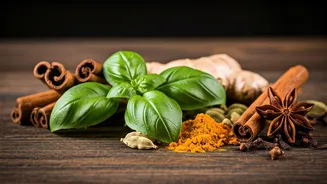Introduction: Air Quality
Diwali, the festival of lights, brings joy and celebrations, but also contributes to a significant rise in air pollution levels. This increase is a consequence
of fireworks, vehicle emissions, and other factors. As the Air Quality Index (AQI) worsens, the impact on human health, especially respiratory systems, becomes a major concern. The following sections will introduce you to several natural herbs and spices that could provide some relief and support your well-being in these challenging conditions.
Turmeric: The Golden Spice
Turmeric, a vibrant spice commonly used in Indian cuisine, contains curcumin, a compound with potent anti-inflammatory properties. This spice can assist in reducing inflammation in the respiratory tract. Its antioxidant capabilities also help neutralize free radicals, safeguarding the lungs from the detrimental effects of pollutants. Consider including turmeric in your diet through curries, warm milk (golden milk), or supplements to possibly gain its benefits.
Ginger: A Respiratory Aid
Ginger, another common household spice, is known for its anti-inflammatory and antioxidant qualities. It can help alleviate symptoms such as coughs and congestion often associated with poor air quality. Ginger might relax the airway muscles, making it easier to breathe. You can consume ginger through tea, add it to your meals, or use ginger-infused supplements, which may contribute to better respiratory health in polluted conditions.
Tulsi: The Holy Basil
Tulsi, or holy basil, revered in India for its medicinal properties, can offer remarkable benefits during times of poor air quality. It acts as an adaptogen, assisting the body in managing stress, and its antioxidant and anti-inflammatory properties may protect the lungs from pollutants. Consuming tulsi leaves directly, brewing them in tea, or using tulsi extracts might support your respiratory system and boost overall well-being when pollution levels are high.
Garlic: A Powerful Ally
Garlic, a culinary staple, offers potent anti-inflammatory and antioxidant effects. It can strengthen the immune system, improving your ability to fight against infections that may arise due to polluted air. Garlic may also help to reduce inflammation in the respiratory system. You can add garlic to your cooking, take garlic supplements, or consume it raw to potentially enhance your body's defenses during times of poor air quality.
Cinnamon: Sweet Relief
Cinnamon, with its delightful aroma and taste, possesses properties that might help counter the effects of air pollution. It has anti-inflammatory properties that can soothe the respiratory tract and alleviate symptoms like coughing. Cinnamon might also assist in reducing the adverse effects of pollutants on the body. Using cinnamon in your cooking, enjoying cinnamon tea, or taking it in supplement form may contribute to respiratory wellness.
Cardamom: Aromatic Support
Cardamom, a spice often used in Indian desserts and teas, boasts several potential health benefits. It is rich in antioxidants, which can assist in protecting against the damage caused by air pollution. Cardamom might help to clear congestion and ease breathing. Incorporate cardamom into your diet through beverages, dishes, or supplements, potentially gaining respiratory support, especially when air quality is compromised.
Black Pepper: Enhanced Absorption
Black pepper, a common seasoning, contains piperine, which boosts the absorption of other beneficial compounds, including curcumin from turmeric. This enhanced absorption can amplify the effects of other spices that help to combat air pollution. Use black pepper in your cooking to enhance the effectiveness of your spice-based health regimen. This can potentially support your body's ability to cope with polluted air conditions.




















